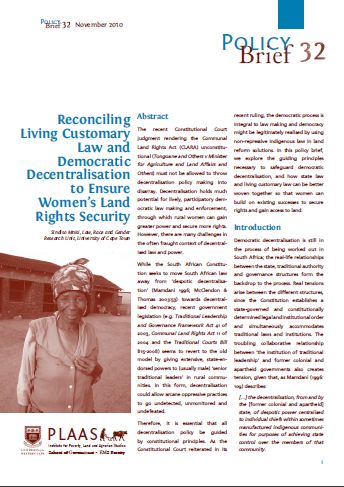Resource information
The recent Constitutional Court judgment rendering the Communal Land Rights Act (CLARA) unconstitutional (Tongoane and Others v Minister for Agriculture and Land Affairs and Others) must not be allowed to throw decentralisation policy making into disarray. Decentralisation holds much potential for lively, participatory democratic law making and enforcement, through which rural women can gain greater power and secure more rights.
However, there are many challenges in the often fraught context of decentralised law and power. While the South African Constitution seeks to move South African law away from ‘despotic decentralisation’ (Mamdani 1996; McClendon & Thomas 2003:53) towards decentralised democracy, recent government legislation (e.g. Traditional Leadership and Governance Framework Act 41 of 2003, Communal Land Rights Act 11 of 2004 and the Traditional Courts Bill B15-2008) seems to revert to the old model by giving extensive, state-endorsed powers to (usually male) ‘senior traditional leaders’ in rural communities. In this form, decentralisation could allow arcane oppressive practices to go undetected, unmonitored and undefeated.

